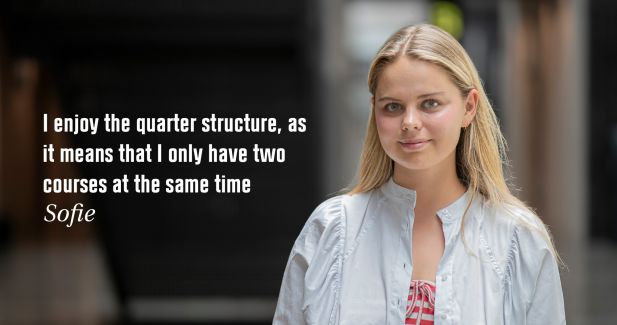BSc in International Business
About the programme
In the BSc IB, you are taught how global markets and economies work and how companies strategically handle the problems that arise when they operate in a foreign market. For example, such challenges could be differences in legislation and regulations in international markets, differences in what foreign customers expect from certain products, how to manage financial resources when you operate in more than one country or dealing with strategic issues in the use and development of technology innovations in global markets.
Understanding the global business environment
The global business environment will be one of the main focus points throughout the BSc IB programme. You will gain the macro perspective by learning how foreign markets work, how laws and regulations made by governments or institutions like the EU affect companies and how to formulate market-entry strategies based on the assessment of foreign market opportunities and competition.
You will also gain the industry perspective by learning how to identify and critically analyse key patterns and trends in various industries, how competition takes place on industry level and how the complexity, unpredictability and changing dynamics of an industry can affect a company.
Understanding global companies
How global companies are organised and operate are also topics you will work with. This micro perspective of how international marketing campaigns are carried out, how a company’s finances are managed across national borders and how companies interact with their customers and competitors in different markets will – together with the macro and industry perspective – give you an extensive understanding of international business.
Imagine that you are working for a subsidiary of an international company. You would need to be able to analyse and solve business problems of an international nature – and to do so you would need to make qualified and sound management decisions. Such decisions revolve around the strategic (internationalisation strategy, business objectives, etc.), structural (e.g. decentralisation of departments) and cultural (e.g. company culture and management style) aspects of the organisation.
You will also investigate how technology can be used to add value to the business, assist in a globalized innovation process and tap into new and unconventional sources of creativity and expertise. Ultimately you will learn the use of techniques for identifying significant international business issues, extrapolate probable outcomes, and develop strategic responses.
Special option during BSc IB
- Global Supply Chain and Logistics Management: on BSc IB, you can apply for GLOBAL SCLM which is a programme focusing on international business, global logistics and supply chain management. The accepted students will spend a semester each in Copenhagen and at two partner universities: The Chinese University of Hong Kong, CUHK in Shenzhen, China and The University of British Columbia, UBC in Vancouver, Canada. Please note that this option only is available to a very limited number of students.
Learn more about GLOBAL SCLM.
- TREBLE: on BSc IB you can apply for TREBLE which is a new tri-continental programme focusing on business knowledge, global experience, and network, from three different continents – U.S, Asia and Europe. The accepted students will spend a semester each at two partner universities, University of North Carolina at Chapel Hill (UNC), Singapore Management University (SMU) and Copenhagen Business School (CBS). Please note that this option is available to a very limited number of students.
Learn more about TREBLE
Hear students share insights about BSc IB
Hear students at BSc IB share some experiences and their thoughts about the programme.
- the complexities of large, globally oriented companies and the international business world in which they operate.
- understanding these globally oriented companies from many different perspectives as the programme encompasses a wide range of topics within business administration. This also means that you will not specialise within one particular field of study before your master’s programme.
The main focus of the programme is on companies and business administration. However, BSc IB also deals with the phenomenon of globalisation including topics such as global trade, political regulations of markets and macroeconomics. It is therefore useful to have a general interest in politics, economics and the cultures of different countries and regions.
Why students chose BSc IB
Students at CBS come from all over the world, and all have different backgrounds. Hear students at BSc IB share their background, and why they chose to apply for the programme.
Challenges and considerations
BSc IB has some particular challenges that are important to think about before you choose the programme. How well do these challenges correspond to the sort of person you are, how you like to work and the things you are good at?
Competitive study environment:
Many students experience the study environment at BSc IB as quite competitive. Certainly, students tend to focus on their results and achievements in the programme as well as in other areas of their lives. It may be a good idea to consider if you would thrive and feel comfortable in such an environment.
Focus on global markets and business strategy:
The main focus in BSc IB is on global markets and business strategy. There are also courses that deal with the economic side of business such as finance and accounting but they are not as central in the programme. If it is the quantitative aspects of business that interest you the most and you see yourself pursuing a master’s programme within e.g. finance then other programmes may prepare you better.
Quarter structure
BSc IB has a so-called “quarter structure” where you follow two courses for about six weeks before taking your exams in those two courses. Each year of study is divided into four such quarters. Some students enjoy this way of working as it allows them to focus on only two courses and two exams at a time. Others find it challenging because it means that you need to keep up your study discipline all the time and if you have just a couple of weeks where you are not very productive it can be challenging to catch up.
International study environment
Even though the programme has a very international focus the share of international students is usually not as high as in the other CBS programmes taught in English. This is worth thinking about if an international study environment is an important factor in your choice of study.
Maths as a tool:
In about half of the mandatory courses in BSc IB you will use maths as a tool. You will not use maths that is complicated beyond the entry requirement for the programme, but you need to be comfortable having courses where you use maths and do calculations at a practical level.
Studying in English
If you are not used to studying in English or if you are not a native speaker, we recommend that you read more about what to consider before applying for an English-taught programme.
See Studying in English on Student Life
Hear a student guidance councellor share some challenges and considerations you should be aware of before applying to BSc IB.
Competencies after BSc IB
The programme will give you:
• a broad understanding of how international/global companies operate
• how international/global companies develop and adapt their business strategies in complex and ever-changing global markets.
You can find more information about what you learn on the programme in the Competence profile for IB
Master's programme after BSc IB
The clear majority of students from BSc IB continue to a two-years master’s programme for a total of five years of study. It is very much the master’s rather than the bachelor programme that determines which career paths that lay open to you.
Most BSc IB graduates tend to end up in larger companies with an international profile – but they work within many different fields of business administration. Read more about master’s programmes and career options.
Hear a student guidance counsellor give insights to how you can create your own profile as well as share thoughts on career options and master's programmes.
Entry requirements
| English - language requirement | A |
| English - specific entry requirement | B with min. 6.0 grade average (Danish scale) |
| Mathematics | B |
| Social Studies OR International Economics OR History of Ideas OR Contemporary History | B |
| Motivational essay | Yes - See Selection quotas |
Read about entry requirements and how to apply at bachelor admission.
| Grade point average | 11.4 |
| Number of enrolled students | 218 |
| Quota 1 / Quota 2 | 60% / 40% |
| Applicants (quota 2) | 1962 (1699) |
| Foreign students | 28% |
| Gender distribution - men / women | 70% / 30% |
| Average age | 21,1 year |





